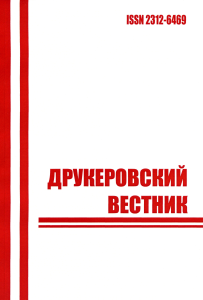Drukerovskij vestnik 2016; 2:
http://dx.doi.org/10.17213/2312-6469-2016-3-160-170
TRAINING PROGRAMS FOR THE INNOVATIVE DEVELOPMENT OF THE KNOWLEDGE-INTENSIVE SECTOR OF RUSSIAN ECONOMY
Ratner Pavel D. - Senior technician of Central Economics and
Mathematics Institute, Moscow, Russia.
4 Nahimovskiy ln., 117418, Moscow, Russia
e-mail: lanarat@gmail.com
Hrustalev Evgeniy Yu. – Doctor of Economic Sciences, Professor, Head
of the Laboratory of Central Economics and Mathematics Institute, Moscow,
Russia.
4 Nahimovskiy ln., 117418, Moscow, Russia
e-mail: stalev@cemi.rssi.ru
Abstract
Currently, professionals in information technology are one of the most required
human resources on the labor market in developed countries, including Russia. Programming
in the majority of Russian universities is studied on a most basic level, quite often using
outdated technology. On the other hand, teaching more modern programming technologies
and methods is a more complex task than using the methods has developed historically. There
is a possibility to solve the problems in teaching programming to students, and this possibility
covers both the modern methods of programming and studying the subject in general:
teaching via games and game-like methods. The goal of this paper is to test and compare
various games and game-like software applications that can be used in studying basics of
programming, both in universities and as additional education.
Keywords: professional training, software tools, second level of education, innovative educational technology.
Full text: [in elibrary.ru]
References
1. Иосифов В.В. и др. История машиностроения: учебное пособие /
В.В. Иосифов, В.Г. Корниенко, А.Г. Схиртладзе, В.Г. Трембач, Ю.В. Трухан,
А.П. Частиков. – Краснодар: КубГТУ, 2010.
2. Лазарева Л.И. Содержательные аспекты формирования информационной
культуры выпускника вуза в контексте новых федеральных государственных
стандартов в системе высшего профессионального образования в России //
Информационное общество. , 2012, №5.
3. Хеннер Е., Стэллманн М. Подготовка специалистов по ИТ: Россия и
США // Открытые системы. – 2013. – № 3.
4. Ратнер С.В., Иосифов В.В. Стимулирование развития
высокотехнологичных отраслей экономики (на примере машиностроения в Германии)
// Вестник Уральского Федерального университета. Серия «Экономика и управление».
– 2012. – № 4. – С. 46-58.
5. Matthew D. Standards fall as global outstrips postgrad opportunities // THE:
Times Higher Education, Dec. 19, 2012.
6. Ратнер С.В. Интерактивные методы в образовательном процессе:
возможности и ограничения // Методика преподавания экономических дисциплин:
Материалы Четырнадцатых Друкеровских чтений / Под ред. Р.М. Нижегородцева. – М.:
ООО «НИКПЦ Восход-А», 2013. – С. 50-57.
7. Ратнер С.В., Слонец И. Образование по направлению «Менеджмент» в
эпоху реиндустриализации: межстрановые сопоставления. // Инновации. – 2013. – №6.
– С. 105-114.
8. Потемпа Т., Ратнер С.В. Высшее образование в области инженерной
экологии: догоняя потребности экономики // Материалы международной научно-
практической конференции «Управление инновациями – 2014», Москва, ИПУ РАН, 17-
19 ноября 2014 г. / Под ред. Р.М. Нижегородцева. – Новочеркасск: ЮРГПУ (НПИ),
2014. – С. 247-251.
9. David Fincham. Introducing Online Leaning in Higher Education: An
Evaluation // Creative Education. 2013. Vol. 4, No. 9: 540-8.
10. Бабешко В.А., Темердашев З.А., Ратнер С.В. Вовлечение творческой
молодежи в инновационную деятельность // Инновации. – 2003. – № 8(65).
11. Anchana Sooksomchitra, Pracob Koraneekij, Jaitip Na-Songkhla. Education
for Social Responsibility: The Use of CSCL in Undergraduate Service Learning Modules //
Creative Education. 2013. Vol. 4, No. 9: 59-62.
